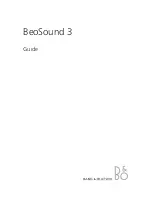
SAFETY INFORMATION
4
Some Do’s and Don’ts on the Safe Use of Equipment
This equipment has been designed and manufactured to meet international safety standards but, like
any electrical equipment, care must be taken if you are to obtain the best results and safety is to be
assured.
DO
read the operating instructions before you attempt to use the equipment.
DO
ensure that all electrical connections (including the mains plug, extension leads and inter-
connections between the pieces of equipment) are properly made and in accordance with the
manufacturer’s instructions. Switch off and unplug th
e power before making or changing connections.
DO
consult your dealer if you are ever in doubt about the installation, operation or safety of your
equipment.
DON’T
remove any fixed cover as this may expose dangerous voltages.
Overheating will cause damage and shorten the life of the equipment.
DON’T
allow electrical equipment to be exposed to dripping or splashing, or objects filled with liquids,
such as vases, to be placed on/near the equipment.
DON’T
place hot objects or naked flame sources such as lighted candles or nightlights on, or close to
equipment. High temperatures can melt plastic and lead to fires.
DON’T
use equipment such as personal stereos or radios so that you are distracted from the
requirements of traffic safety.
DON’T
leave equipment switched on when it is unattended unless it is specifically stated that it is
designed for unattended operation. Switch off using the switch on the equipment and make sure that
your family knows how to do this. Special arrangements may need to be made for infirm or
handicapped people.
DON’T
continue to operate the equipment if you are in any doubt about if it’s working normally or if it’s
damaged in any way. Switch it off, unplug the mains power and consult your dealer.
ESD Remark
: In case of malfunction due to electrostatic discharge just reset the product
(reconnection of mains power may be required) to resume normal operation.
SAFETY
INFORMA
TION
INTRODUCTION
PANEL
& REMOTE
UNIT OPERA
TION
REFERENCE
Downloaded From Disc-Player.com TEAC Manuals








































